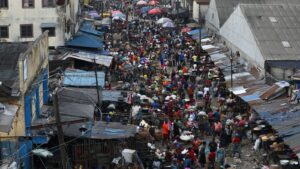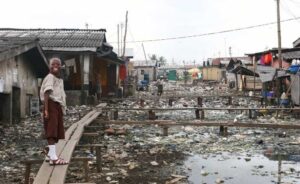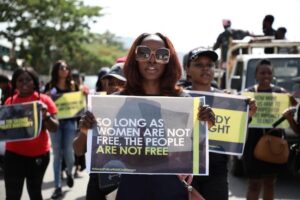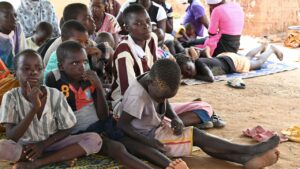
Peace, Justice and Strong Institutions
Sustainable Development Goal 16 (SDG 16) centers around promoting peace, justice, and strong institutions.
Donate Now
Sustainable Development Goal 16 (SDG 16) centers around promoting peace, justice, and strong institutions.
Donate NowSustainable Development Goal 16 (SDG 16) centers around promoting peace, justice, and strong institutions.
It recognizes that peace, good governance, and effective institutions are crucial for sustainable development.
At ROE we collaborate with stakeholders to promote peaceful and inclusive societies for sustainable development, provide access to justice for all and build effective, accountable, and inclusive institutions at all levels.
Peace, justice and effective, accountable, and inclusive institutions are at the core of sustainable development.
Several places in Nigeria still face protracted armed conflict and violence, and far too many people struggle as a result of weak institutions and the lack of access to justice, information, and other fundamental freedoms.
We have been involved in conflict monitoring, enabling the participation of remote and isolated communities in democratic processes and ensuring enforcement of legislation and access to reliable information. Support us in this task by donating to the program.

Sustainable Development Goal 11 (SDG 11) focuses on creating sustainable cities and communities. It recognizes that urban areas are central to addressing various global challenges
Donate NowSustainable Development Goal 11 (SDG 11) focuses on creating sustainable cities and communities.
It recognizes that urban areas are central to addressing various global challenges and aims to make cities inclusive, safe, resilient, and sustainable.
Cities are hubs for ideas, commerce, culture, science, productivity, social development, and much more; they have enabled people to advance socially and economically.
However, many challenges exist to maintaining cities in a way that continues to create jobs and prosperity without straining land and resources.
In Nigeria, successive government regimes commenced numerous development commissions, agencies, and departments to foster development at local, regional, and national levels.
But these government strategies have failed due to poor integration of essential variables such as culture and or poorly coordinated community development activities.
Again, lip service on the part of the government has proven to be one of the challenges in developing sustainable communities.
At ROE, we collaborate with stakeholders in ensuring more efficient public transportation, walkable and bike-able neighborhoods, advocate for solar energy, green buildings, food production, accessible public resources, water conservation, disaster management, infrastructure monitoring, search and rescue operations, smart waste management system, and tree planting.

Sustainable Development Goal 5 (SDG 5) aims to achieve gender equality and empower all women and girls.
Donate NowROE realized that there is strength in collaboration and teamwork in the achievement of set goals hence the need to extend our hand of fellowship to you.
United Nations also realized that a successful sustainable development agenda requires partnerships between governments, the private sector, and civil society.
These inclusive partnerships, built upon principles and values, a shared vision, and shared goals that place people and the planet at the center, are needed at the global, regional, national, and local levels.
At ROE, we collaborate with Government, private sectors, and civil societies to achieve the set goals. We receive donations, gifts, contributions, subsidies, grants, and other modes of receipt of money for the furtherance of the objects of Rhapsody of Experiences in conformity with applicable laws.
We promote good values among our members and stakeholders. You can support us today by donating. Your donation is tax-deductible and will be acknowledged and receipted instantly.

Sustainable Development Goal 5 (SDG 5) aims to achieve gender equality and empower all women and girls.
Donate NowReduced inequality aims at reducing inequality within and among countries.
This SDG 10 calls for reducing inequalities in income as well as those based on age, sex, disability, race, ethnicity, origin, religion, or economic or other status within a country.
Nigeria scored 35.1 in the 2022 Gini coefficient on countries with wealth inequality. With this score, Nigeria is 11th in West Africa and 100th out of 163 countries globally.
Poverty and inequality in Nigeria are not due to a lack of resources but to the ill-use, misallocation, and misappropriation of such resources. At the root, there is a culture of corruption and rent-seeking combined with a political elite out of touch with the daily struggles of average Nigerians.
ROE has been playing a key role in the reduction of inequality by collaborating with stakeholders in championing connectivity in remote and isolated areas, encouraging remote participation in democratic processes, reliable access to information, and equal opportunities which continue within the country.

Sustainable Development Goal 5 (SDG 5) aims to achieve gender equality and empower all women and girls.
Donate NowSustainable Development Goal 5 (SDG 5) aims to achieve gender equality and empower all women and girls.
It is a primary objective of ROE. This objective aligns with the Sustainable Development Goal of the United Nations and seeks to reduce the rate of child marriage and improve sexual and reproductive health and reproductive rights, including fewer maternal deaths.
Gender equality remains a challenge in Nigeria. While the Nigerian Constitution provides for gender equality and non-discrimination, women continue to suffer injustices and marginalization.
This is often a result of discriminatory laws, religious and cultural norms, gender stereotypes, low levels of education, and the disproportionate effect of poverty on women.
ROE continues to play a role in this goal by collaborating with stakeholders in ensuring that girls have access to quality education even in remote and isolated communities.
We also provide and support female entrepreneurship, through access to training, soft infrastructure, information, and safety in the work environment including empowerment.

SDG 4 recognizes that education is a fundamental human right and a key driver of sustainable development.
Donate NowSDG 4 recognizes that education is a fundamental human right and a key driver of sustainable development.
By achieving this goal, societies can empower individuals, reduce inequalities, promote economic growth, and foster a more inclusive and equitable world.
Sustainable Development Goal 4 (SDG 4) aims to ensure inclusive and equitable quality education and promote lifelong learning opportunities for all. It focuses on providing access to quality education at all levels, improving educational outcomes, and fostering a conducive learning environment.
In Nigeria, educational performance is abysmally low in terms of quality and quantity. Poor performance with regards to quantity is illustrated by the fact that a 2022 UNESCO report noted that approximately 20 million Nigerian individuals out of its approximately 200 million population are not enrolled in school.
This amounts to 20 percent of Nigeria’s entire population and is more than the overall population of various countries in Africa.
Since 2018, ROE has been collaborating with individuals and corporate organizations to ensure accessible quality education for children.